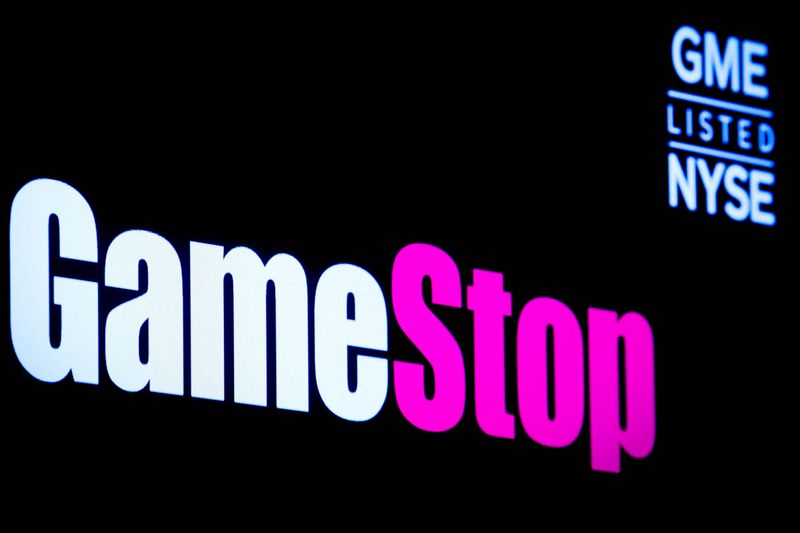[ad_1]
By Medha Singh
NEW YORK (Reuters) -GameStop shares jumped around 30% on Monday after the stocks influencer known as „Roaring Kitty” returned to Reddit with a post showing a $116 million bet on the embattled videogame retailer.
Shares of GameStop (NYSE:) had surged as much as 75% earlier on Monday, and some $3.8 billion worth of GameStop shares had changed hands as of 2:15 p.m. ET (1815 GMT), making it the most heavily traded stock on the NYSE, according to LSEG data.
The post was the first in three years by Keith Gill, the Roaring Kitty stocks influencer behind the 2021 retail trading frenzy, from his Reddit account. In 2021, screenshots on Reddit of his bullish GameStop trades triggered a rush of demand for „meme stocks” – often companies with weak fundamentals that gained a cult-like following through social media hype among retail traders.
The screenshot posted on Sunday showed a GameStop holding of 5 million shares, or 1.8% of its publicly available stock. Gill’s last post from April 2021, titled „final update,” showed a holding of 200,000 shares worth $30.9 million.
Reuters could not verify the screenshot on Reddit, and Gill did not respond to a request for comment on Reddit or email.
Sunday’s post also revealed $65.7 million worth of call options expiring on June 21 at a strike price of $20.
GameStop shares on Monday afternoon were trading at around $31.00
The stock wrapped up a volatile month at $23 on Friday, about 33% higher since Gill began sharing cryptic posts and memes from his „Roaring Kitty” account on X in May, sparking speculation over whether he would resume sharing his trades online after the hiatus.
„Keith Gill is putting his money where his tweets are, and some investors are clearly following his lead and rekindling interest in meme stocks,” said Ben Laidler, global markets strategist at digital brokerage eToro.
„This is having a disproportionate share price impact given the short position in the stock combined with its relatively small market capitalization.”
Monday’s surge put GameStop short sellers on track to rack up nearly $1 billion in paper losses, according to data and analytics firm Ortex Technologies. The short position in GameStop stood at 57.6 million shares, or 18.4% of the outstanding shares, Ortex data showed. That compares to 162% in 2021, when the stock had its initial, eye-popping rally.
Garrett DeSimone, head of quantitative research at OptionMetrics, said individual investors likely comprise a large part of the recent trading in GameStop.
But while GameStop’s 2021 surge saw retail traders banding together against Wall Street institutions that were short the stock, the apparent lack of a common enemy could give some investors less reason to stay with their bullish bets this time around, DeSimone said.
„It’s always good to have a common enemy that gets people riled up. … But there’s really no boogeyman or no 'sticking it to the man situation here,'” DeSimone said. „I think retail investors that bought in this morning are probably not going to be too happy with the outcome in the next couple of days.”
Other shares associated with the meme stock phenomenon also rallied on Monday. Shares of AMC were recently up around 13%, while Reddit shares were up 2.8%.
GameStop was the second most-traded stock on retail brokerage Fidelity.
MAY’S MEME RALLY
GameStop raised $933 million by selling shares to cash in on a meme stock rally last month, when the stock doubled in value. Still, shares are down sharply from their May peak and down about 70% from 2021 highs.
„Even as it (GameStop) faded from public consciousness and the headlines since mid-May, it remained a very active stock on our platform, consistently among the top 10 names,” said Steve Sosnick, chief strategist at Interactive Brokers (NASDAQ:).

GameStop has been grappling with slowing sales as its core business of selling new and pre-owned videogame disks takes a hit from consumers’ moving to downloading games digitally or streaming.
It is expected to post first-quarter results on June 11. Last month, it warned that first-quarter net sales would drop to between $872 million and $892 million, from $1.24 billion a year ago.
[ad_2]
Source link
